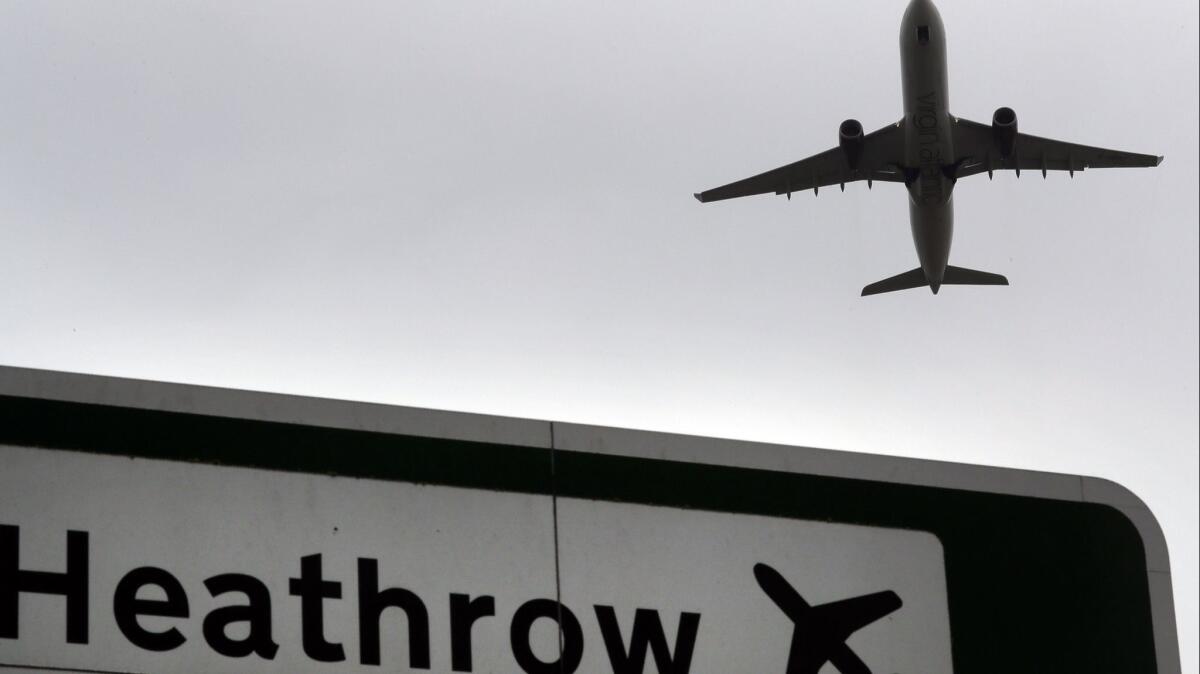JetBlue’s low-cost London flights could put pressure on Delta, American and United

- Share via
The hugely popular air routes between the U.S. and Europe are dominated by the biggest U.S. airlines, which partner with international carriers to fly travelers to other parts of the world.
Icelandic carrier Wow Air tried to undermine the status quo with dirt-cheap flights across the Atlantic Ocean. It shut down abruptly last month.
Norwegian Air, another low-cost carrier that tried to shake up the industry with bare-bones transatlantic fares, was forced by cost overruns to sell aircraft, cut routes and postpone delivery of new planes.
Now along comes New York-based JetBlue Airways with plans to launch low-cost service from Boston and New York to London in 2021.
Despite the financial calamity that has fallen on other low-cost carriers, JetBlue may be able to break into the transatlantic market, with ticket prices that even working-class travelers can afford, according to industry analysts.
JetBlue may succeed partly because it has a loyal East Coast following and offers a highly popular business-class ticket with lie-flat seats and flat-screen televisions, experts say. And just to be safe, the airline is starting off modestly so it can test the market before investing too heavily.
“JetBlue seems to be taking a more cautious approach,” said Madhu Unnikrishnan, editor of the publication Airline Weekly. “They are doing it in a low-risk way, unlike Norwegian and Wow, so it’s worth launching.”
If JetBlue succeeds, the introduction of a new low-cost rival for transatlantic flights is likely to put pressure on carriers such as Delta, American and United, which charge as much as $8,000 for a round-trip business-class seat on flights to Europe.
A study by the travel research site Hopper found that when JetBlue has launched new domestic routes in the past, overall prices on that route dropped by more than 50%. When the airline added new international routes, overall prices dipped about 12%.
“There is definitely that potential for them to do the same,” Unnikrishnan said.
One reason low-cost carriers have struggled to compete against large carriers on transatlantic flights is that Delta, United and American already offer a competitive bare-bones fare, called “basic economy” on flights to Europe.
But analysts say JetBlue might have better luck competing with the bigger rivals because, in addition to offering economy seats, the carrier also sells a business-class fare, dubbed Mint with comfy lie-flat seats and upgraded food and drinks.
JetBlue is prohibited by federal law from discussing future ticket prices but Unnikrishnan said that based on JetBlue’s current fares, the transatlantic Mint ticket could be priced at about $1,200 — compared with $8,000 business-class fares on the larger airlines.
“I think the biggest advantage JetBlue has will be its Mint product, which is very highly regarded in the U.S. transcontinental market and in other long-haul markets where the aircraft is in service,” said Helane Becker, an analyst who covers airlines for Cowen & Co.
And large rivals will be less likely to try to quash JetBlue with competing fares if JetBlue “doesn’t expand or price too aggressively,” said Philip Baggaley, a senior transportation analyst at Standard & Poor’s Ratings Services.
When JetBlue announced plans to fly to London from Boston and New York, the airline’s president and chief operating officer, Joanna Geraghty, took a shot at the fares charged by her rivals, vowing to give travelers another option.
“Given a chance to compete, JetBlue can have a tremendous effect on lowering fares and stimulating traffic,” she said.
The announcement got a warm welcome on social media, with many travelers complaining that they have to wait until 2021 to buy the transatlantic tickets on JetBlue.
JetBlue has not announced which airport it plans to serve in London, but Heathrow Airport is the closest and preferred airport to England’s largest city.
If JetBlue plans to fly to Heathrow, it is not clear whether the carrier will have to pay or trade for slots with another airline that already operates at the airport. Slots are scheduled times when an airline can use a runway.
Slots at Heathrow can be pricey.
Oman Air, the national airline of Oman, set a record in 2017, paying $75 million in a deal with Air France, KLM and Kenya Airway for a pair of take-off and landing slots at Heathrow.
JetBlue spokesman Philip Stewart declined to say which airport the carrier plans to serve or how it would acquire future slots. “We are confident that we have a viable path into more than one London airport,” he said.
JetBlue’s strategy of starting out with one European destination before expanding quickly may be what will save the carrier from suffering the fate of other low-cost carriers that have ventured into low-cost transatlantic routes.
Norwegian Air, the Oslo-based carrier that began in 2013 to sell discounted transatlantic fares, was forced to streamline its operations and delay delivery of new planes due to a rapid expansion, surging fuel costs and mechanical problems that left the carrier with big debt and steep revenue losses.
Norwegian Air spokesman Anders Lindstrom acknowledged that the carrier has been growing fast, adding 25 routes from the U.S. to Europe last year. So far this year, Norwegian has only added four transatlantic routes, he said.
“Our focus is to return to profitability in 2019,” he said. “Looking forward, it’s going to be more sustainable rather than rapid growth.”
As for Wow Air, the low-cost carrier that launched routes between North America and Europe in 2015, analysts say it also grew too fast and was forced to cut service to Europe last year from cities including Cleveland, St. Louis, Miami and Cincinnati. But that was not enough to save the airline.
When separate deals to sell the carrier and to bring in capital from an industry investor fell through, Wow Air ceased operations in March, leaving thousands of passengers stranded and frustrated.
To read more about the travel and tourism industries, follow @hugomartin on Twitter.
More to Read
Inside the business of entertainment
The Wide Shot brings you news, analysis and insights on everything from streaming wars to production — and what it all means for the future.
You may occasionally receive promotional content from the Los Angeles Times.











